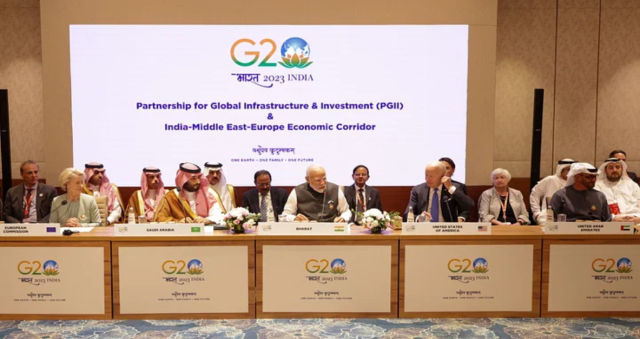
The recently concluded G20 summit in New Delhi, India, was a great success for Prime Minister Narendra Modi and his country. While China has economic problems, India is taking an increasingly large place on the world stage.
India, “a rowdy and robust democracy” according to Washington Post, has already passed China in population this year and is also projected to outpace China in economic growth for 2023.
India on the offensive
There is no shortage of confidence from the Indian hosts. A lot of large billboards were covered with images of the lotus flower, India’s national flower. But it is also the governing BJP-party symbol. This symbol was visible everywhere in New Delhi and other cities, even in the official logo of the G20.
Mr. Modi scored diplomatic points by inviting to the G20 meeting the 55-member African Union to participate. It was a sign of how the Indian Prime Minister is working to make India a voice for the Global South.
Many observers did not think there would be any final declaration due to the obvious conflicts between the West, on the one hand, and Russia and China, on the other. But the host country’s Prime Minister Modi pressed participating countries to agree on a communique that denounced the use of force for territorial gain, although the apparently designated country – Russia – was not mentioned in plain text.
This action has prompted observers to ask, “Has India cracked the code of diplomatic consensus?” The Atlantic Council conclude that India forges a new model of inclusive diplomacy. When the summit came to an end, it was clear that India’s objectives were not derailed, despite the cruel war of aggression that Russia is conducting in Ukraine that divides the G20 countries.
China on the defensive
The manner in which Modi led the summit leads experts to state that he is cementing his leadership of the Global South, while Chinese President Xi “contained” himself. The absence of Xi Jinping “was the big story and will cast the longest shadow over world affairs”, wrights foreign correspondent Michael Schuman based in Beijing.
Xi was the G20’s biggest loser by vacating the scene and let Modi and the American President Joe Biden promote their perspective. The meeting therefore highlighted China’s growing isolation from other major world powers.
New infrastructure: Corridor from India to Europe
To counterbalance China’s economic investments in the region, a new ship-to-rail transit network that will connect India, through the Middel East, to Europe was announced parallel to the G20-meeting. The plan is regarded as a big win not only for Europe but also for India and the countries as Israel, Jordan, Saudi Arabia and United Arab Emirates.
This new Economic Corridor (IMEC) was described as “much more than just a railway or a cable” by the European commission president Ursula von der Leyen. It is a “green and digital bridge” across continents and civilisations, she said.
But so far there are only sketchy details shared about IMEC.
The direction is renewable energy
On environment, the communique also backet a target of tripling global renewable energy capacity by 2030 and committing to “a phasedown of coal” in line with national circumstances. Both India and China are increasing their coal consumption despite concerns about global climate change.
European leaders as French President Emmanuel Macron was not happy with the wording, claiming the world must reduce coal burning very rapidly.
Counterweight to communist China
Most observers agree that the world’s largest democracy is now emerging as a significant player on the global stage, something the G20 hosting has confirmed. Prime Minister Modi has promoted his country as a mediator between the West and Russia. India has also become an important counterweight to China’s ambitions.



 Subscribe
Subscribe